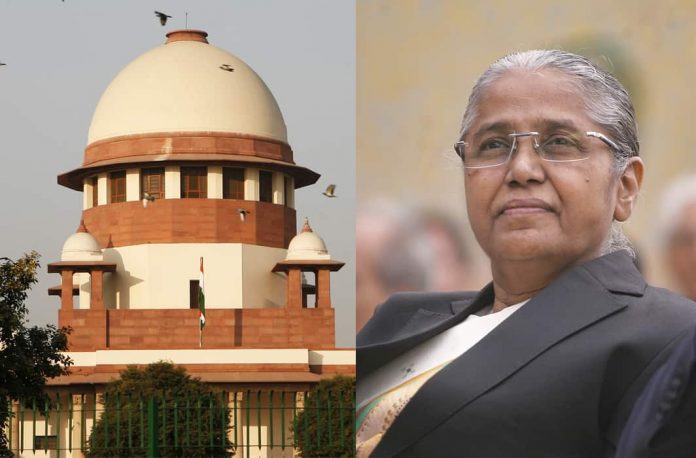A Judge known for writing the most numbers of judgments, Justice R. Banumathi served her last day in the Judiciary this Friday (July 17). She had been elevated to the Supreme Court in the year 2014.
Born in 1955, Justice R. Banumathi enrolled herself as an advocate in 1981. Justice Banumathi, in her initial days started her practice from Mofussil Court at Tirapattur, Krishnagiri, and Harur, Tamilnadu.
Justice Banumathi has also served as Member of Board of Governors and as a President of Board of Governors in the State Judicial Academy and has also authored the book “Handbook of Civil and Criminal Courts Management and Use of Computers” for the guidance of District Judiciary and published Hand Books for the guidance of Judicial Ministerial Staff.
Justice Banumathi has always been not only known for the highest number of judgments, but also for her fearlessness, rigor, and thoroughness in her judgments. She had also authored several books.
Bidding farewell to Justice Banumathi, we will look at her some of the key judgments authored by Justice Banumathi in her serving six years at Supreme Court.
1. Chief Information Commissioner Vs High Court of Gujarat
In the latest Judgment, Justice Banumathi held that the Right to Information applications for Gujarat High Court pleadings cannot be filed by a third party. However, one can use the system established by the High Court rules.
Justice Banumathi stated in her judgment that “The information to be accessed/certified copies on the judicial side to be obtained through the mechanism provided under the High Court Rules, the provisions of the RTI Act shall not be resorted to.”
The Judgment set a precedent for all the High Courts, as well as the apex court.
2. Bir Singh Vs Delhi Jal Board
The issue in this case before a five-judge bench was “whether a person belonging to a Scheduled Caste in relation to a particular state would be entitled or not, to the benefits or concessions allowed to Scheduled Caste candidate in the matter of employment, in any other state?”
The bench unanimously held that the status of SC/ ST is a state-specific status under Article 341 and 342 of the Constitution of India. Hence, one who holds an SC/ ST status in one state cannot get benefitted from the same in another state.
On the question of clamming reservation in Union Territories, most of them were silent, Whereas, Justice Banumathi observed that no SC/ ST could claim benefits in a Union Territory.
Justice Banumathi further observed that “If this is permitted, it would defeat the very object of providing reservation to the disadvantaged Scheduled Castes and Scheduled Tribes in a particular State or Union territory. The enabling provision of Article 16(4) of the Constitution has to yield to the constitutional scheme of Article 341 and Article 342 of the Constitution.”
3. Modern Dental College & Research Centre Vs State of Madhya Pradesh
It was held that the state can regulate the admissions and fees of private colleges, but the right to freedom of occupation provided under Article 19(1)(g) of the Constitution should not be violated.
Justice Banumathi also explained the ‘Doctrine of Proportionality’ stating that, “Undoubtedly, the right to establish and manage the educational institutions is a fundamental right recognized under Article 19(1)(g) of the Act. It also cannot be denied that this right is not ‘absolute’ and is subject to limitations i.e. ‘reasonable restrictions’ that can be imposed by law on the exercise of the rights that are conferred under clause (1) of Article 19. Those restrictions, however, have to be reasonable. Further, such restrictions should be ‘in the interest of general public’, which conditions are stipulated in clause (6) of Article 19.”
4. Mukesh & Anr. Vs State for NCT of Delhi & Ors.
The court upheld the death sentence awarded by Delhi High Court in the Horrifying Nirbhaya Rape Case, a23-year-old girl who took a ride on a bus on her way home, with a male friend that evening, where she was subjected to inhuman assault.
Justice Banumathi wrote: “In the present case, there is not even a hint of hesitation in my mind with respect to the aggravating circumstances outweighing the mitigating circumstances and I do not find any justification to convert the death sentence imposed by the courts below to ‘life imprisonment for the rest of the life’. The gruesome offences were committed with highest viciousness. Human lust was allowed to take such a demonic form. The accused may not be hardened criminals; but the cruel manner in which the gang-rape was committed in the moving bus; iron rods were inserted in the private parts of the victim; and the coldness with which both the victims were thrown naked in cold wintery night of December, shocks the collective conscience of the society. ”
“The present case clearly comes within the category of ‘rarest of rare case’ where the question of any other punishment is ‘unquestionably foreclosed’,”, Justice Banumathi added.
– India Legal Bureau


